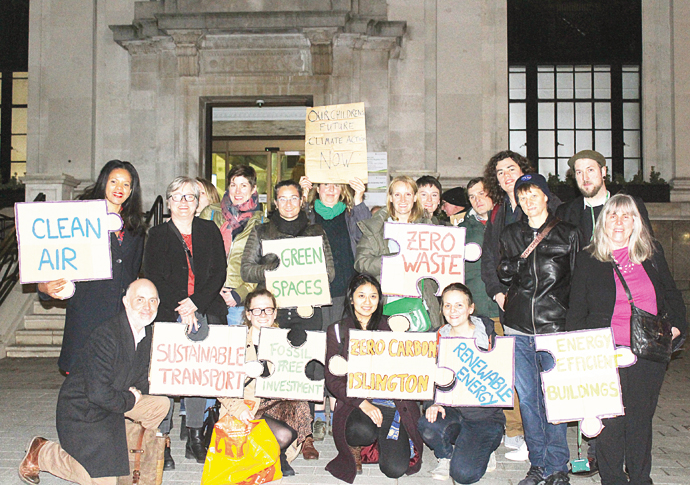Climate change – the issue
Friday, 17th January 2020

March 2019 and councillors join climate protesters outside the Town Hall
• THE three-year budget proposal for Islington was released for review last week.
As an environmental campaigner it was a disheartening read.
While acknowledging the many critical services that the council is continuing to maintain in our borough during the last 10 years of central governmental cuts, I was amazed by the absolute negligence of, what is in my opinion the biggest issue facing all of us today, climate change.
The proposed spending during the next three years on environmental causes as confirmed by more than one councillor over twitter, amounts to £15million.
This might seem a lot but let’s have a closer look.
The first million is put in to complete Bunhill Phase 2, commenced in 2014. A great initiative but in a climate emergency we need to see a plan for a series of these to be rolled out, not a final cheque put towards completing a scheme already delayed and above budget.
The next £2million is mainly about moving traffic around.
Implementing CCTV networks to enforce the policies, Islington Council is firstly proposing to move lorries from residential roads to main roads.
While this is absolutely the right thing to do in order to improve air quality and safety in residential, it will not reduce traffic or indeed the pollution caused by traffic in any meaningful way.
Another initiative drawn from this £2million is for the continued deployment of “school streets”.
Again, this is a great initiative, as it reduces direct air pollution exposure, preventing cars from poisoning kids outside their place of education at key hours of the day.
However, neither initiative demonstrates an expressive intention to reduce traffic, the second biggest polluter in the borough.
In fact, it is even explicitly stated in the budget that a school street “…is only introduced on non-main roads so should not substantially affect traffic”.
The next £7.5million involves cycle lanes, safety schemes, EV charging points and other infrastructure that could make some difference in shifting our preferences away from motorised transport.
However, the 2020/21 amount has been cut by £2million since the last budget.
I’ll just leave that there.
And then there is the £5million towards making the council’s own fleet more environmentally friendly. Another important programme, ongoing for some time and primarily in place to comply with the incoming (and much anticipated) Ultra Low Emission Zone in 2021. So not one of these initiatives, totalling a grandiose 3.14 per cent of the entire budget, is new or increased funding in a climate emergency reality, or funding that demonstrates the urgency to get Islington onto a net zero carbon trajectory – not one.
I still wonder how Islington Council defines an emergency. This is what I think it means:
An emergency is defined as “a dangerous or serious situation… and (one that) needs immediate action”.
An “emergency action is one that is done or arranged quickly and not in the normal way…”.
So other than a vast amount of word soup coming from a whole series of Labour councillors since this borough took the very brave decision to declare a climate emergency in June 2019, sadly the budget is just a continuation of this council’s response. Anything but adequate.
I then thought to double check that maybe some of this climate emergency expenditure was lurking in the £425million allocated towards housing, knowing energy efficiency initiatives is the other huge area this borough needs to address in order to reach a net zero by 2030 (and it helps fuel poverty, of course).
Nope, retrofitting and making homes more energy efficient is not mentioned once.
What an opportunity missed, not only in order to communicate via the budget what the council’s intentions are but also to mark the potential for new jobs and opportunities that we need to prepare for in anticipation of the “green jobs revolution”.
While I find communication from this Labour-led council usually about average, what they are exceptionally good at reminding us of, however, is central government cuts.
But sadly this situation cannot carry the position of blaming someone else, regardless how much at fault they are.
This situation demands knowledgeable leadership, lateral thinking, and innovative and collaborative approaches to raise the much-needed capital required to drive truly meaningful changes in the borough.
This emergency calls for openness and willingness to learn, acceptance that no one knows everything and a bravery that straddles party politics and ranks.
This crisis requires transparency and communication with business and community groups to identify and implement solutions.
At a large scale! Now!
You cannot and shouldn’t do this alone, elected members of Islington Council.
We are all here to help and support.
But if you think that what has been presented in the budget suggests urgency and ambition, I am wondering whether you have been listening at all?
HELENA FARSTAD
Address supplied